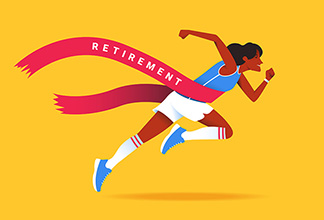On Our Minds: What We Learned from Naomi Osaka
Written by The Inspired Investor Team
Published on June 18, 2021
minute read
Share:
Recently, the highest-paid female athlete in history withdrew from two of tennis' highest-profile tournaments: Wimbledon (to spend more time with friends and family) and the French Open (citing her mental health). Naomi Osaka hasn't always had a smooth ride. Some may remember her as the rising star who was booed at the U.S. Open in September 2018 when she beat Serena Williams, one of the greatest athletes of all time. Subsequently, Osaka earned the support of a proud Williams, and went on to win the 2019 Australian Open and a second U.S. Open title in 2020.
Osaka's tenacity and self-awareness are truly admirable. As investors, we understand the importance of knowing ourselves and looking at things long-term. Knowing what we're comfortable with (risk tolerance), what we need in the future (planning) and why we're investing in the first place (goal setting) can build confidence and, ultimately, lead to better decision-making. Osaka has all of those qualities in spades.
While it's true that we can't all be top athletes, we can be inspired by Osaka's self-awareness in action, knowing that in life and investing, this can go a long way. Here are a few things to consider when determining what's right for you:
Know yourself: What are your investment goals? What's your risk tolerance? How long is your time horizon? Understanding what type of investor you are is the first step to developing an investing plan. This can help guide your decisions about asset mix and what types of securities to invest in.
Follow your values: Investing and saving with purpose can help you stick to your plan. For example, some investors have embraced responsible investing, which considers environmental, social and governance (ESG) factors. Depending on what matters to you, that could include looking at investments through the lens of sustainability or board diversity, or avoiding “sin stocks" (such as alcohol, tobacco, gambling).
Chart your own course: Sure, there are well-established ways of doing things in almost every arena, but you don't have to follow the crowd. Understanding the cognitive biases that can influence your investing decisions—such as anchoring, confirmation bias, loss aversion and the bandwagon effect—can help you stay true to your goals.
Focus on the future: Investing is often about the long game—the more time you're invested in the market, the more time you have to grow your wealth (and to weather the market ups and downs). Naomi Osaka has a long career ahead of her, and prioritizing self-care now is key to her future success. Similarly, when making investing decisions, thinking long term can help you reach your full potential.
Make tough decisions: Depending on the situation, short-term sacrifices can help one flourish. For some investors, that could mean selling stocks earlier than expected to meet other financial obligations, or to rebalance their portfolio. There are several rational reasons for sell decisions, and learning about them can help you base your actions on logic rather than emotions.
RBC Direct Investing Inc. and Royal Bank of Canada are separate corporate entities which are affiliated. RBC Direct Investing Inc. is a wholly owned subsidiary of Royal Bank of Canada and is a Member of the Canadian Investment Regulatory Organization and the Canadian Investor Protection Fund. Royal Bank of Canada and certain of its issuers are related to RBC Direct Investing Inc. RBC Direct Investing Inc. does not provide investment advice or recommendations regarding the purchase or sale of any securities. Investors are responsible for their own investment decisions. RBC Direct Investing is a business name used by RBC Direct Investing Inc. ® / ™ Trademark(s) of Royal Bank of Canada. RBC and Royal Bank are registered trademarks of Royal Bank of Canada. Used under licence.
© Royal Bank of Canada 2025.
Any information, opinions or views provided in this document, including hyperlinks to the RBC Direct Investing Inc. website or the websites of its affiliates or third parties, are for your general information only, and are not intended to provide legal, investment, financial, accounting, tax or other professional advice. While information presented is believed to be factual and current, its accuracy is not guaranteed and it should not be regarded as a complete analysis of the subjects discussed. All expressions of opinion reflect the judgment of the author(s) as of the date of publication and are subject to change. No endorsement of any third parties or their advice, opinions, information, products or services is expressly given or implied by RBC Direct Investing Inc. or its affiliates. You should consult with your advisor before taking any action based upon the information contained in this document.
Furthermore, the products, services and securities referred to in this publication are only available in Canada and other jurisdictions where they may be legally offered for sale. Information available on the RBC Direct Investing website is intended for access by residents of Canada only, and should not be accessed from any jurisdiction outside Canada.
Explore More

Should I Invest or Pay Down My Mortgage?
Consider these four questions
minute read

As Many Head Back to the Office, Where Could Investors See Changes?
How returning to in-person work could affect a range of investments
minute read

Considering the FIRE Lifestyle? Here’s What Your Investments Might Look Like
We asked three people how they created financial independence and retired early
minute read
Inspired Investor brings you personal stories, timely information and expert insights to empower your investment decisions. Visit About Us to find out more.







